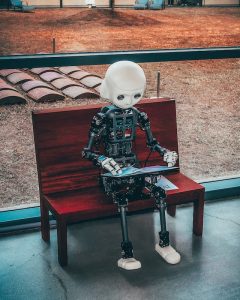
Five years ago I wrote about the automation of jobs, as it was already a prominent and somewhat anxiety provoking topic back then. In 2018 the general sense around automation was that even though robots are there to do more of the easier and ‘linear’ tasks, for example replacing cashiers in the grocery stores, more complex job tasks would continue to be performed by humans. This is what I wrote back then: ‘Robots might be quite good at precise tasks that have a clear pattern, for example driving on a freeway, yet, tasks which require intuition, flexibility, innovation and a holistic approach will still be predominantly concentrated in the human domain. Indeed, as a general population we seem to have unrealistic expectations towards AI capabilities, whereas a robot’s grasping technique is still at the level of a three-year old, and AI keeps failing the Turing test. Professor Goldberg notes that the human frontier is still as hard to master for AI as it was a decade ago.’
Well, isn’t it exciting to be surprised and proven wrong from time to time? 🙂
In November 2022, a chatbot ChatGPT was launched by OpenAI and it has been making headlines and filling endless Twitter threads since then. This new AI tool can write emails and reports, creative texts and stories, generate song lyrics and poems, create legal documents, write code, and is smart enough to pass graduate-level exams… The chatbot became very popular in no time, probably making it the fastest-growing consumer application in history. Indeed, ChatGPT is so wanted right now that the servers are overloaded and unable to take on any additional requests. My own plan to try out the chatbot for writing this article didn’t succeed precisely for that reason. Such high demand is probably justified. Already in its early stage, ChatGPT seems to do several creative jobs well enough, and its potential is clearly to do such jobs better and faster than humans. As such, are we back to experiencing a robots-are-taking-over frenzy, and should copywriters, journalists, bloggers, and other written content creators join in?
Ken Goldberg, the professor and department chair of industrial engineering and operations research at UC Berkeley, whom I cited in the blog post in 2018, seems to double down on his claim that AI is not a threat to humans. In his tweet Ken states that “I’m not worried about robots or AI as a threat to humans. Anyone whose work involves providing human interaction, being creative, or doing anything that requires dexterity is safe.” The Nobel-winning psychologist Daniel Kahneman has a different take on it though, saying already in 2021 that ‘clearly AI is going to win against human intelligence´. Having made a career out of studying human cognitive biases, Prof. Kahneman foresees great disruption in many domains relying traditionally on human judgement and decision making. For example, Kahneman asks what will happen to human leadership once AI clearly demonstrates its superiority over humans in making good business judgements and decisions.
In general, Daniel Kahneman argues that we are not great in making predictions and future oriented judgements, which is why I would also refrain from any clear predictions about how it all will turn out. Yet, it is quite clear already that such technological breakthroughs as with ChatGPT will continue to happen, making disruptions to the old ways of working inevitable. Authors of the insightful book Power and Prediction: The Disruptive Economics of Artificial Intelligence highlight that AI is upskilling people, making certain traditionally more exclusive tasks, like writing a creative text well, doable for many more people. Similar to Uber’s technology that created an entirely new system of ride-hailing, ChatGPT will also create something new. Naturally, no big change or disruption is easy or comfortable nor does it remain unnoticed… some struggle is probably inevitable. But as we take the leap and get to the other side eventually, it might turn out well. Just think about how we enjoy the easily accessible Uber rides, Wolt food deliveries, and conversations with Alexa – something which was new, frightening, and disruptive to some job domains at first.
Then again, Kahneman does warn us against optimism bias…

